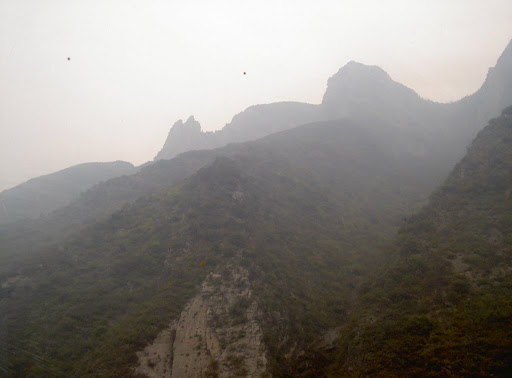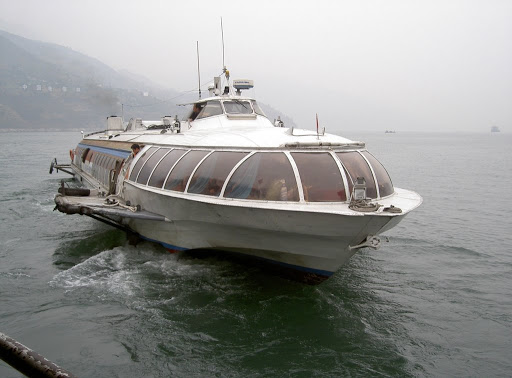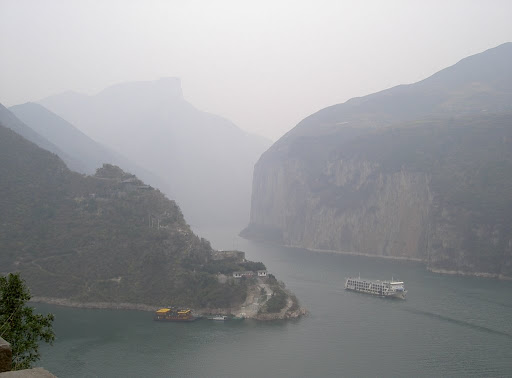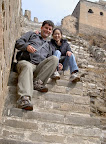 "I haven't had enough sleep!" screamed my body as the alarm clock rang. No choice! We were meeting our guide Shirley down at the hotel lobby at 6am for our tour of the Three Gorges after only 3 hours sleep.
"I haven't had enough sleep!" screamed my body as the alarm clock rang. No choice! We were meeting our guide Shirley down at the hotel lobby at 6am for our tour of the Three Gorges after only 3 hours sleep.It was misty, or smoggy, as usual as we drove out in our van on the hour long trip to the docks. Faint silhouettes of mountains suggested beautiful scenery, although our eyes kept shutting, stealing more sleep.
A steep staircase flanked by two huge funiculars greeted us at the docks. We had to clamber over docked river cruisers in order to reach our sleek hydrofoil. We found three seats near the front as the boat filled up with workers in transit between the river towns. This was a working transport boat, not a tourist cruiser.
 Through Xiling Gorge we passed hills yellow with rapeseed flowers or boxy new concrete homes clinging to the steep edges of the valley. The hydrofoil sped past flat, narrow ships transporting all manner of goods, from phosophorus to trucks, along the river.
Through Xiling Gorge we passed hills yellow with rapeseed flowers or boxy new concrete homes clinging to the steep edges of the valley. The hydrofoil sped past flat, narrow ships transporting all manner of goods, from phosophorus to trucks, along the river.Long Wu Gorge was the most spectacular with steep geologically folded cliffs and tall forested peaks, each with a name.
The last of the Three Gorges was Qutang. While the scenery adjacent to the river was not as impressive as Wu Gorge, the dramatic mountain range surrounding it loomed large behind the smoggy air.
Throughout the journey we could see a pale strip a few metres high running along the waterline. The water level in the dam has actually dropped from summer, as the water supply is locked up as ice in the mountains over winter. The water colour is a clean blue green now, but once the ice melts it will turn muddy brown again. Signs show that ultimately the water will rise about 15 metres higher than the current level, submerging more of the scenery.
 After some negotiation between Shirley and the boat crew we were dropped off at the base of Fengjie. A yet uncompleted bridge loomed tall over the small fishing docks. Shrimps covered the roofs of the small fishing vessels, drying in the sun. We ate carp straight from the boat and noodles under a tarpaulin, the fishermen noisily playing mahjong at another table.
After some negotiation between Shirley and the boat crew we were dropped off at the base of Fengjie. A yet uncompleted bridge loomed tall over the small fishing docks. Shrimps covered the roofs of the small fishing vessels, drying in the sun. We ate carp straight from the boat and noodles under a tarpaulin, the fishermen noisily playing mahjong at another table.More steep stairs led us up the hill to Fengjie, White Emporer Temple. A noble had a vision of white mist rising from a well in the form of a dragon. As a dragon is the symbol of an emperor he went about making himself king of the region, with the help of a brilliant strategist.
 The temple is a quiet place suited for contemplation, with ponds, pavilions, blossoming trees and some beautiful views over Qutang Gorge. The complex is surrounded by peeling red walls and fading but colourful reliefs and contains black steles of poetry inspired by the beauty of the gorges.
The temple is a quiet place suited for contemplation, with ponds, pavilions, blossoming trees and some beautiful views over Qutang Gorge. The complex is surrounded by peeling red walls and fading but colourful reliefs and contains black steles of poetry inspired by the beauty of the gorges.After walking back down to the fishing docks we discovered that the boat would not arrive for a while. It was an opportunity to chat with Shirley about life in China. We came away thankful for living in a first world country, how it gives us some many more opportunities. There are so many restrictions on realising your full potential in China, so much competition for resources, the familial duties which bind your choices. Even the disparity of wages means that it is difficult for young Chinese to travel overseas, something which they would benefit a lot from, giving them an opportunity to discover alternatives.
 We were forced to find seats in the dirty rear of the boat for the ride home. Smoke from the engines frequently entered the cabin and the windows were cracked and patched. There was not much opportunity to view the scenery and all of us slept for a while, exhausted by the early start.
We were forced to find seats in the dirty rear of the boat for the ride home. Smoke from the engines frequently entered the cabin and the windows were cracked and patched. There was not much opportunity to view the scenery and all of us slept for a while, exhausted by the early start.On our ride back from the docks to Yichang we passed the giant dam locks, were told of an even bigger "ship elevator" to life tourist ships all the way from the base of the dam to the top in one movement.
 The expressway back to Yichang took us past some magnificent scenery, looking down to the Yangtze River with a backdrop of mountains. This was where Mao had swum across the river, proclaiming that the dam should be built, though the process started long after he died. From one view the mountain tops appear like his facing looking upwards, so this area is considered auspicious for the dam.
The expressway back to Yichang took us past some magnificent scenery, looking down to the Yangtze River with a backdrop of mountains. This was where Mao had swum across the river, proclaiming that the dam should be built, though the process started long after he died. From one view the mountain tops appear like his facing looking upwards, so this area is considered auspicious for the dam.Shirley pointed out to us that our hotel was just across from the public square, recommending that we go to the top floor of the only department store for a food court. We followed her instructions and indeed had a delicious dinner. We had very pleasant wander back to the hotel past groups of people dancing, or just walking around relaxing in the colourfully lit square. A "magic fountain" reflected the many lights at its base as alternate sections sprayed water into the air.
Prior to Yichang we were doubtful about using the services of a local guide, thinking that we would just get a prepackaged spiel and run between the sights. But we greatly enjoyed talking to Shirley and she really went out of her way to make our stay here very pleasant. Thank you!
This will probably be the last post here until we reach Shanghai. In a few hours we will be on the overnight train to Nanjing for a day, then another overnight train to Huangshan. A night up the summit of Huangshan, then an overnight train to Shanghai. It promises to be very tiring!


